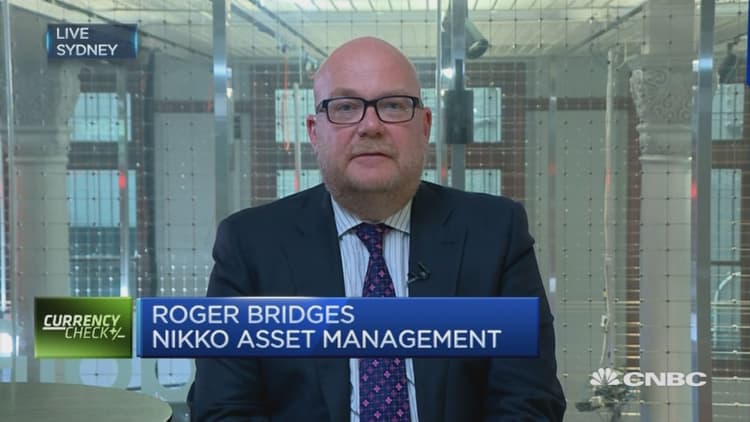
The Trump administration's sabre-rattling on the strong U.S. dollar will run afoul of real-world economics, said Roger Bridges, global rates and currencies strategist at Nikko Asset Management.
The dollar tumbled on Tuesday after Peter Navarro, the head of U.S. President Donald Trump's new National Trade Council, told the Financial Times that Germany was using a "grossly undervalued" euro to gain advantage over the U.S. and its own European Union partners.
That marked a continuation of efforts by Trump himself and other officials to jawbone the dollar lower.
In the wake of Trump's surprise election win, , which measures the greenback against a basket of currencies that heavily weights the euro, climbed to a 14-year high.
The move was driven by Trump's campaign rhetoric advocating of tax cuts for individuals and companies as well as substantial infrastructure projects, which appeared set to boost the government's deficit spending. That would in turn drive U.S. interest rates higher, taking the dollar along for the ride.
And Bridges told CNBC's "Street Signs" on Wednesday that Trump's polices would work against efforts to weaken the greenback.
"What the Trump administration is trying to do is in fact roll back what economic theory would suggest," he said.
"With the American economy as it is and you try to do fiscal expansion, the effect of that in any model where you've got floating exchange rates and freedom of capital movement, is that your rates go up and your currency goes up," Bridges said. Nikko Asset Management had $176.5 billion in total assets under management as of the end of September.
"But obviously, the administration is trying to really take the flack away from what his policies may do – put the U.S. dollar up – but also try to reflect that onto other currencies, particularly ."
The euro rose as high as $1.0811 on Tuesday in the wake of Navarro's comments, from levels under $1.07.
But Bridges noted that the aggressive rhetoric against Germany, a staunch U.S. ally, was unjustified, particularly as euro weakness was largely driven by the European Central Bank's (ECB) easy monetary policy.
"Germany's been the one country which really hasn't liked this policy. It was a bit unfair on Germany," he said.
In response to Navarro's comments, German Chancellor Angela Merkel noted on Tuesday that her country has always called on the ECB to set policy independently, adding that her government will not influence the central bank's policy, Reuters reported.
But Bridges added that with inflation in Europe and particularly in Germany on the rise, the euro was set to trend higher.
Official data from Germany's statistics office this week showed consumer price inflation across the country in January was 1.9 percent year-on-year, the highest level since July 2013.
"There's going to be pressure on the council in the ECB," Bridges said, noting that the ECB may taper its quantitative easing program. "Everyone saw the euro going to parity. That may be off the cards."
Last month, ECB President Mario Draghi said rising inflation on the continent hadn't yet shown a convincing trend for the central bank to change course.
At its December meeting, the ECB had said it would extend its generous bond-buying program at a reduced pace of purchases of 60 billion euros ($64.46 billion) a month from April, down from 80 billion euros.
—By CNBC.Com's Leslie Shaffer; Follow her on Twitter @LeslieShaffer1



